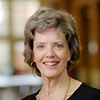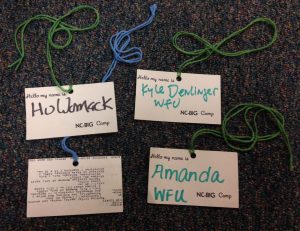This article is more than 5 years old.
NC-BIG Camp had the coolest name tags ever! Designed by Kyle and printed by Craig Fansler.
On Friday, May 30 Hu, Amanda, Kyle, and Joy traveled to UNC-Greensboro to attend the second annual meeting of NC-BIG. NC-BIG is sponsored by the Bibliographic Instruction section of the North Carolina Library Association. Kyle was on the steering committee, and it was an extremely organized and well-planned unconference. The entire event consisted of three break-out sessions with four group choices in each session. Unlike NC-LITe, this was a larger group of librarians representing a variety of institution types such as high schools, community colleges, public libraries, special libraries (from the Research Triangle Park), and college and universities. Here are some of the breakout sessions we attended:
Presentation Tips and Tools(Joy)
The facilitator for this group was Amanda Glenn-Bradley who works at UNC-Asheville. I always enjoy learning about new presentation ideas and tools, and this session delivered both. I decided to try out Haiku Deck to demonstrate one of the free presentation tools I learned about. Here’s the presentation, and I think it looks great, but I had to switch it to Google Presentation to make it public (I could not get it to upload to Slideshare) and I was not able to include links to the tools. I thought the most helpful link shared was Sam Harlow’s Free Media Software LibGuide. I mentioned this link in my NC-LITe post, but her guides are simply amazing and include tools for MindMaps, Brainstorming, Screencasts, Presentations, Word Clouds, etc. We could use a ZSR LibGuide like this!!
Digital and Visual Literacies (Joy)
I think I have become a Sam Harlow groupie! Sam (the facilitator for this session) is the Media & Digital Resource Librarian at High Point University and she works with faculty to help them integrate digital resources into their curriculums. ACRL developed Visual Literacy Competency Standards for Higher Education in October 2011. Visual Literacy is defined as a set of abilities that enables an individual to effectively find, interpret, evaluate, use, and create images and visual media. Digital literacy is defined as the ability to use information and communication technologies to find, evaluate, create, and communicate information, requiring both cognitive and technical skills. The part I found most interesting in this session was Sam’s discussion of her Research Poster Creation instruction sessions. She even offers suggestions for developing and grading multimedia projects.
ACRL Information Literacy Framework (Amanda)
This breakout session was quite popular — everyone wants to talk about the framework! As we get further into summer break, I believe librarians have had more time to digest the recent drafts of the new framework. Since then, the discussions about the framework are only getting better and more thought-provoking. Several interesting ideas were discussed at NC-BIG Camp. One was using the new information literacy framework as a gateway to move away from information literacy as a one-shot library instruction session and into something that is integrated throughout the curriculum. I think this will be difficult for many libraries, especially those without lots of institutional/faculty buy-in and some wondered if it was necessary to get institutional buy-in for the new framework. Since not all the threshold concepts have been decided upon, we also made predictions on what threshold concepts may be coming down the pipe in upcoming drafts of the framework to be revealed around the time of ALA. I placed my bets on something that encompasses Information as Commodity* or Information Privilege so we will have to wait and see! (*This is not my idea, I’m basing my guess on possible threshold concepts presented in this article: Troublesome Concepts and Information Literacy: Investigating Threshold Concepts for IL Instruction).
Program Assessment (Amanda)
Joy and I led a breakout session on program assessment. Though we were “leading” the discussion, I think we both learned quite a lot about what some other institutions in the area are doing for program assessment. For example, we learned that Wake Tech is also participating in Assessment in Action: Academic Libraries and Student Success and overhauled their information literacy assessment and wrote a 100 page (!!) QEP proposal for information literacy. They detailed the changes they made to their program assessment and the group discussed moving away from “user satisfaction” assessment to “did they learn” assessment. This theme was repeated later in a breakout session about Student Learning Outcome Assessment, where we discussed final product assessment.
Creative Outreach Programs(Hu)
Facilitating this session was the highlight of my day! First, it offered me the opportunity to introduce the session by talking about all the great outreach programs at ZSR this semester! After discussing the new ZSR Fellow position, and their role in planning and implementing these big events, I described the Dean’s List Gala, The Future of Higher Education Symposium “The Big Disruption: The Coming Transformation of Higher Education,” and the Connections and Conversations, an alumni weekend focused on well-being, I also mentioned the 5th Annual Senior Showcase , and ZSR’s Role in the Wake Will Capital Campaign.
This led to a discussion of creative outreach programs at other libraries. Here are some highlights from the session notes:
- Durham Public Libraries have a new bookmobile and they are revamping that program. They also have a new library mascot, a moose the kids named, you can “check out” the moose and take it on vacation!
- High Point University worked with a group of freshman leaders, from student government, to promote the library, host an event, and share the library’s page on social media. (This reminded me of our Library Ambassadors program!)
- Meredith College has a sports equipment collection that circulates; student activities funds went toward it; students get to know them and come into the Library!
- Campbell Student Government came to the library with a lunch, and Librarians talked to these students about their lives, the library, the chat service, all in an effort to better know their users.
- Vance-Granville Community College in Henderson– Poster competition through an art class and a professor; online scavenger hunt
Libraries at commuter schools are a particular challenge. Creative outreach programs at these schools must reach students who spend a minimal amount of time on campus, increasing the need for opportunities to effectively engage these students online. We had a diverse group of libraries represented at this session, and it was inspiring to hear such a variety of creative outreach stories.
Gaming and Gamification (Kyle)
This session was all over the place, as people approached it with completely different ideas of what gaming in libraries means. I actually can’t believe we were able to talk about all of these things, but we did:
- game lending programs
- video game labs (such as that at UNCG)
- gaming events in the library that serve the purpose of outreach (like our own HvZ and Capture the Flag, and other libraries that have hosted board game nights),
- library instruction disguised as big games (such as the live-action CLUE game at UNC-CH that has students solving a murder mystery by combing through some pieces in their special collections)
- “gamified” library instructional materials (such as the “Goblin Threat” plagiarism game)
- “gamified” library instruction in general (which includes digital badging programs like Purdue’s Passport)
I was glad I went to this one! I went into it thinking we’d just talk about gamifying library instruction, but I learned so much from some of the folks there that are paying more attention to gaming in general.
Teaching with Technology (Kyle)
I facilitated this session, which was a lot of fun. We each got a chance to share some of our successes with using technology in the classroom, some failures we’ve learned from, some of our favorite instructional technology tools, and how we keep up with new developments in instructional technology. I wound up sharing a lot about ZSRx, which I didn’t expect to do, since NC-BIG is focused on classroom instruction. Nonetheless, people were eager to learn about what we’ve been doing with that platform, and I was able to share some of the tools I’ve been using to build those courses. Out of that discussion, I learned that Durham County Public Library is working with a contractor to offer more than 500 free online courses, which is kind of amazing.


2 Comments on ‘NC-BIG Camp @ UNC-G 2014’
awesome all around
Thanks so much all of you for writing this up for those of us who couldn’t go – some great ideas here – live action Clue – I am TOTALLY in!!!